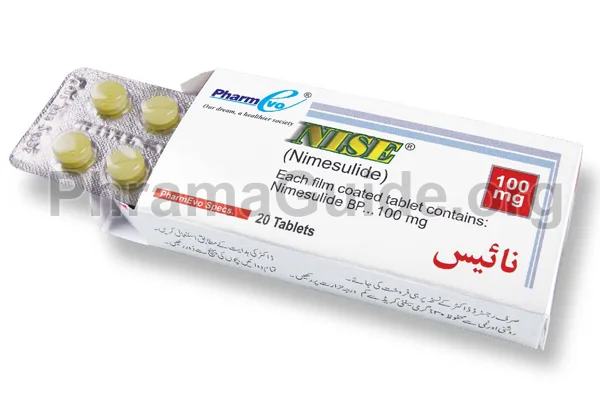Nise is a nonsteroidal anti-inflammatory drug (NSAID) that is used to relieve pain and reduce inflammation. Like many medications, it can have side effects. Here are some common and less common side effects associated with Nise.
Common Side Effects:
- Gastrointestinal Issues: These are the most common side effects of Nise and other NSAIDs. They may include stomach pain, indigestion, heartburn, nausea, and in some cases, gastric ulcers or bleeding. Long-term or high-dose use can increase the risk of these gastrointestinal problems.
- Headache: Some people may experience headaches as a side effect of Nise.
- Dizziness: Nise can cause dizziness or lightheadedness in some individuals.
- Rash: Skin rashes or itching can occur as a side effect.
Less Common Side Effects:
- Allergic Reactions: While rare, Nise can cause severe allergic reactions in some people, including hives, difficulty breathing, and swelling of the face, lips, tongue, or throat.
- Liver Damage: There have been reports of severe liver damage associated with Nise, although this is a rare side effect. Signs of liver problems may include yellowing of the skin or eyes (jaundice), dark urine, and abdominal pain. Due to this risk, Nise is restricted or banned in some countries.
- Kidney Dysfunction: Some individuals may experience kidney problems, including decreased urine output and fluid retention. This is more common in people with pre-existing kidney issues.
- Blood Disorders: There have been rare cases of blood disorders, such as decreased white blood cell count (leukopenia) or platelet count (thrombocytopenia), associated with Nise use.
- Cardiovascular Effects: While less common, NSAIDs like Nise can increase the risk of heart attacks, strokes, and high blood pressure in some individuals, especially those with pre-existing heart conditions.
- Asthma Exacerbation: Nise can worsen asthma symptoms in some people.
- Gastrointestinal Perforation: Though rare, NSAIDs like Nise can cause gastrointestinal perforation, a severe condition in which a hole forms in the stomach or intestines.

What is Nise?
Nise is one of the leading brands of Nimesulide, manufactured and marketed by PharmEvo Private Limited, Pakistan.
Nise : Available Formulations and Strengths
Presently, Nise is available in tablet form
Nise Tablet : 100mg strength
What Are The Possible Drug Interactions of Nise?
- Other NSAIDs: Taking multiple NSAIDs together can increase the risk of gastrointestinal side effects and may not provide additional benefits in pain relief. Combining Nise with other NSAIDs, such as ibuprofen or aspirin, is generally not recommended.
- Anticoagulants (Blood Thinners): Nise can increase the risk of bleeding when taken with anticoagulant medications like warfarin or heparin. It’s essential to closely monitor blood clotting times when using these medications together.
- Antiplatelet Drugs: Combining Nise with antiplatelet drugs, such as aspirin, can also increase the risk of bleeding.
- Selective Serotonin Reuptake Inhibitors (SSRIs) and Serotonin-Norepinephrine Reuptake Inhibitors (SNRIs): When taken with Nise, these antidepressant medications can increase the risk of bleeding, especially in the gastrointestinal tract.
- Corticosteroids: Concurrent use of Nise and corticosteroids can increase the risk of gastrointestinal ulcers and bleeding.
- Methotrexate: Nise can reduce the clearance of methotrexate, leading to increased levels of methotrexate in the body, which can be toxic.
- Lithium: Nise can increase lithium levels in the blood, potentially leading to lithium toxicity.
- Cyclosporine and Tacrolimus: Nise can interact with these immunosuppressant drugs, affecting their blood levels and effectiveness.
- Diuretics: NSAIDs like Nise can reduce the effectiveness of diuretics and may increase the risk of kidney problems when taken with certain diuretics.
- ACE Inhibitors and Angiotensin II Receptor Blockers (ARBs): Nise can decrease the blood pressure-lowering effects of these medications, potentially reducing their effectiveness in managing high blood pressure.
- Medications for High Blood Pressure: Nise may interfere with the blood pressure-lowering effects of certain antihypertensive drugs, such as beta-blockers and diuretics.
- Phenytoin: Nise may increase the levels of phenytoin in the blood, leading to a higher risk of phenytoin-related side effects.

Leave A Comment